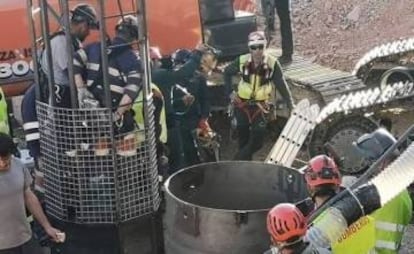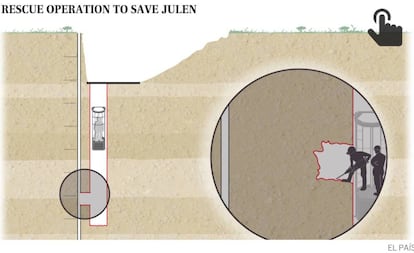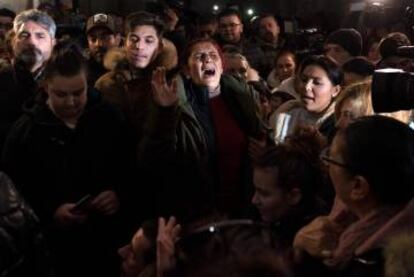Julen Roselló rescue mission: miners nearly done digging tunnel to trapped toddler
Rescue teams have excavated 3.15 of the estimated 3.8 meters separating them from the two-year-old

Miners sent down in search of Julen Roselló, a two-year-old boy who fell down a deep borehole in southern Spain on January 13, have now excavated 3.15 out of the estimated 3.8 meters of rock that separate them from the trapped child.
After battling for nearly 24 hours against quartzite, a very hard rock, miners have now encountered less resistant material.

Eight miners flown in from the northern region of Asturias have been going down a vertical shaft running parallel to the narrow borehole in teams of two since Thursday evening, working in 40-minute shifts and carrying their own oxygen bottles.
Jorge Martín, a spokesman for Spain’s Civil Guard, said that explosives experts have set off three small controlled explosions inside the tunnel to help the miners, who are dealing with quartzite, a very hard rock to break through.
Martín would not provide an estimated time of completion. The nature of the terrain has caused numerous delays in a 12-day search-and-rescue operation fraught with complications. “The mountain is the boss on this job,” summed up the spokesman.
Most of the work is being done by hand for safety reasons, and progress is painstakingly slow.
Example of a micro-explosion
“We are moving forward centimeter by centimeter. We hope to end by today but we cannot guarantee this because of the circumstances of the terrain,” said Francisco Delgado, head of the regional fire department.
Coordinating the micro-explosions is also “very complicated,” said Martín. He said that two miners must first go down the shaft and bore a few holes. They are then followed by two specialized officers who set up the explosives. Once they go back above ground, the explosives are detonated and then the team must wait half an hour to clear the shaft of polluted air. “The whole process can take more than two hours,” he explained.

Some local residents have spent the night near the worksite to show support for Julen’s parents. “Despite the difficulties we need to remain strong and show all our support to the family,” tweeted María Gámez, a government official in Málaga.
Eight firefighters and 10 Civil Guard officers are also participating in what is considered the riskiest part of the rescue operation.

An impromptu search-and-rescue effort has been set up in Totalán, Málaga, where around 300 people and dozens of companies have been volunteering time, equipment and expertise in an increasingly desperate bid to find the child alive. A team of 13 engineers has been coordinating the work of over 100 machine operators and technicians, backed up by dozens of firefighters, emergency workers and 18 psychologists.
The abruptness of the terrain and the geology of the area have created constant delays for the team that drilled a vertical shaft running parallel to the borehole, which is 110 meters deep but only around 25 centimeters in diameter, making it impossible for an adult to go down. The lead engineer overseeing the effort, Ángel García Vidal, has described it as “not so much a rescue operation, as a work of humanitarian civil engineering.”
Miners are now manually digging a connection between both shafts at the spot where Julen is believed to be trapped. A camera inserted into the borehole ran into a plug of earth at a depth of around 70 meters, which the child presumably dislodged during his fall. The only evidence of his presence so far are some strands of hair that match his DNA and a bag of snacks that he had been holding.
Julen was spending the day with his family at a rural property on January 13, where relatives were preparing a Sunday paella, when he apparently slipped down a water prospecting borehole that was loosely covered with rocks.
English version by Susana Urra.
Tu suscripción se está usando en otro dispositivo
¿Quieres añadir otro usuario a tu suscripción?
Si continúas leyendo en este dispositivo, no se podrá leer en el otro.
FlechaTu suscripción se está usando en otro dispositivo y solo puedes acceder a EL PAÍS desde un dispositivo a la vez.
Si quieres compartir tu cuenta, cambia tu suscripción a la modalidad Premium, así podrás añadir otro usuario. Cada uno accederá con su propia cuenta de email, lo que os permitirá personalizar vuestra experiencia en EL PAÍS.
¿Tienes una suscripción de empresa? Accede aquí para contratar más cuentas.
En el caso de no saber quién está usando tu cuenta, te recomendamos cambiar tu contraseña aquí.
Si decides continuar compartiendo tu cuenta, este mensaje se mostrará en tu dispositivo y en el de la otra persona que está usando tu cuenta de forma indefinida, afectando a tu experiencia de lectura. Puedes consultar aquí los términos y condiciones de la suscripción digital.








































